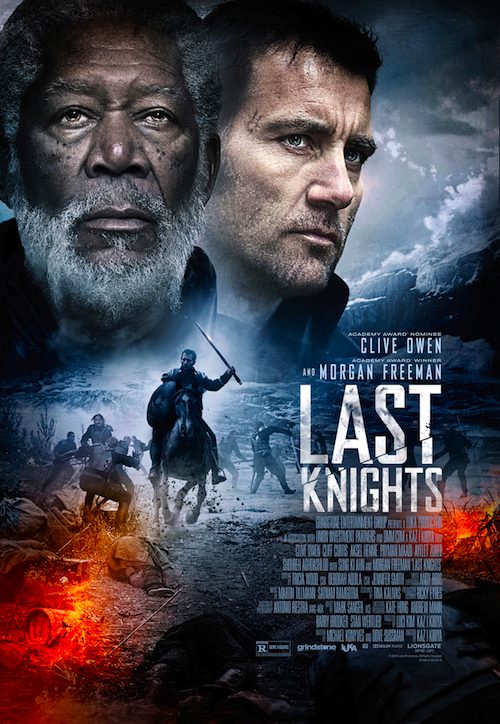By Joe Bendel. Unfortunately, the early Eighteenth Century band of heroes known as the 47 Ronin were effectively defeated before they ever began to fight. With their lord disgraced and their clan evicted from its holdings, the masterless samurai achieved a measure of payback, but it only delayed the inevitable end demanded by their bushido code. Western concepts of honor and chivalry are somewhat different, but the wardrobe and weaponry are close enough for government work. It is a story Japanese filmmaker Kazuaki Kiriya must have heard countless times growing up. He now brings their classic tale west, resetting it in a Medieval European looking realm for his first English language production, Last Knights, which opens this Friday in New York.
Lord Bartok is a wise and just clan leader, who also experiments with atonal composition. His forces are captained by Raiden, a warrior who rose up from the peasantry to be renowned for his badassery. While Bartok lands remain peaceful, trouble brews in the capitol, where the Emperor’s chancellor, Geza Mott has become brazen in his corruption. Bartok arrives at court to rally the noblemen against Mott, but he is outplayed by the tyrannical psychopath. Sadly, it will cost Bartok his head and the anguished Raiden will be the one to sever it.
The Bartok clan is dispossessed and dispersed, with his guardsmen assuming civilian jobs. They mostly get on with their new lives, except Raiden, who retreats inside a cask of ale. However, the paranoid Mott cannot believe the Bartok commander is not biding his time, which of course he is. Nevertheless, his honorable but honor-bound lieutenant Ito is convinced Raiden is the empty shell of a man he appears to be.
 Evidently, this is the sort of empire Alexander aspired to rule, spanning all the known continents of the Middle Ages. Its relentlessly multi-ethnic composition makes little historical sense, but at least it allows Kiriya to assemble a truly international ensemble, including Morgan Freeman as Lord Bartok, Iranian Peyman Moaadi (best known for A Separation) as the Emperor, Norwegian Aksel Hennie (Headhunters) as Mott, and veteran Korean actor Ahn Sung-ki as his principled father-in-law, Lord Auguste. Some of that casting makes sense, some of it not so much.
Evidently, this is the sort of empire Alexander aspired to rule, spanning all the known continents of the Middle Ages. Its relentlessly multi-ethnic composition makes little historical sense, but at least it allows Kiriya to assemble a truly international ensemble, including Morgan Freeman as Lord Bartok, Iranian Peyman Moaadi (best known for A Separation) as the Emperor, Norwegian Aksel Hennie (Headhunters) as Mott, and veteran Korean actor Ahn Sung-ki as his principled father-in-law, Lord Auguste. Some of that casting makes sense, some of it not so much.
Not surprisingly, Freeman gives an exquisitely dignified defiance-in-the-face-of-death speech that the film never really tops. Still, Ahn gives it all kinds of gravitas it would not otherwise have. To his credit, Hennie exhibits no shame or modesty hamming it up something fierce as Mott. It is also nice to see Shohreh Aghdashloo, no matter how briefly, as Lady Bartok. On the other hand, Moaadi just looks and sounds uncomfortable as the Emperor.
Clive Owen is relatively solid in the lead, since Raiden is definitely the strong, silent type. Frankly, he is one of the few name actors working today who is manly enough to swing a broad sword convincingly. Nevertheless, Tsuyoshi Ihara upstages everyone as Ito, the retainer disgusted by his master but duty-bound to do his bidding. He has first-class action chops, but also expresses his character’s classically tragic nature.
Knights is so obviously the 47 Ronin, it is weird the film does not make winking acknowledgement in some way, but perhaps the producers were a little skittish about the connection, given the egg laid at the box office by the Keanu Reeves remake. There is some decent swordplay in Knights, but also some awkward personal drama. Most of possum-playing Raiden’s scenes with his long suffering wife Naomi (Israeli Ayelet Zurer) are truly cringe-worthy. At least the film productively gets down to business when it is time to storm the castle. It is also strangely fascinating to spot each new nationality the filmmakers manage to inclusively shoehorn in. Recommended as a guilty pleasure for fans of swashbuckling with no pretense of verisimilitude, Last Knights opens this Friday (4/3) in New York, at the Quad Cinema.
LFM GRADE: B-
Posted on April 1st, 2015 at 2:50pm.